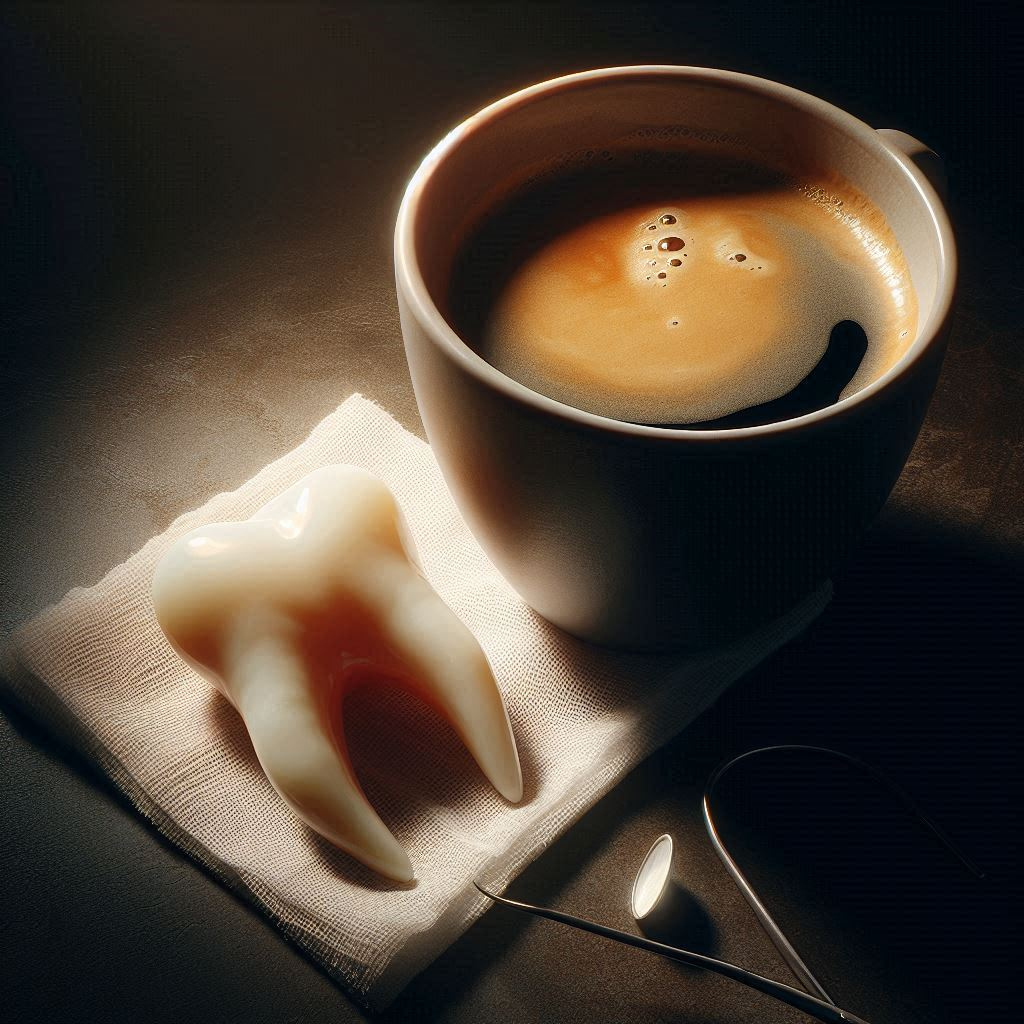You’ve just had a tooth extracted, and as you sit in recovery, a familiar craving hits you: coffee. But can you indulge in your favorite brew after this dental procedure? The question “Can I drink coffee after tooth extraction?” is more common than you might think, with over 10 million tooth extractions performed annually in the United States alone.
For many, the thought of foregoing their daily cup of joe can be as distressing as the extraction itself. Coffee isn’t just a beverage; it’s a ritual, a comfort, and for some, a necessity to function throughout the day. However, the post-extraction period is crucial for proper healing, and what you consume can significantly impact your recovery.
This article will delve into the intricacies of drinking coffee after tooth extraction, exploring the potential risks, benefits, and expert recommendations. We’ll provide you with the knowledge to make an informed decision about your post-extraction coffee consumption, ensuring you balance your love for coffee with the need for optimal oral health recovery.
Roots of the Roast
Tooth extraction is a common dental procedure that involves removing a tooth from its socket in the jawbone. This can be necessary for various reasons, including severe decay, gum disease, trauma, or to make space for orthodontic treatment. The extraction process creates a wound in the soft tissue and bone of the mouth, initiating a complex healing process that typically takes about 7-10 days for initial closure and several weeks for complete healing.
During this healing period, the formation of a blood clot in the extraction site is crucial. This clot serves as a protective barrier over the exposed bone and nerves, promoting tissue regeneration and preventing complications such as dry socket—a painful condition where the clot is dislodged or dissolves prematurely.
The question of whether one can drink coffee after tooth extraction is significant because of coffee’s potential effects on this healing process. Coffee is not just a popular beverage; it’s a complex mixture of compounds that can influence our body in various ways. It contains caffeine, which can constrict blood vessels and potentially slow healing. Additionally, coffee is often consumed hot, which could affect the blood clot, and its acidity might irritate the extraction site.
Understanding the impact of drinking coffee after tooth extraction is particularly relevant for the millions of coffee enthusiasts who undergo this procedure each year. For many, coffee is an integral part of their daily routine, providing not just a caffeine boost but also comfort and ritual. The prospect of abstaining from coffee during recovery can be daunting, leading many patients to seek clarity on when and how they can safely reintroduce their favorite beverage.
As we explore this topic, we’ll consider both the physiological aspects of post-extraction healing and the practical concerns of coffee lovers, aiming to provide a comprehensive guide to navigating this common dilemma.
The Full Brewdown
Immediate Post-Extraction Period (24-48 hours)
In the first 24 to 48 hours after tooth extraction, it’s generally recommended to avoid drinking coffee. This critical period is when the blood clot begins to form and stabilize at the extraction site. During this time, several factors make drinking coffee after tooth extraction potentially problematic:
- Temperature: Hot coffee can disrupt the formation of the blood clot or dislodge it if already formed. This increases the risk of developing dry socket, a painful condition that can delay healing.
- Caffeine: As a vasoconstrictor, caffeine can narrow blood vessels, potentially slowing blood flow to the extraction site and impeding the healing process.
- Acidity: Coffee’s acidic nature may irritate the wound, causing discomfort and possibly interfering with healing.
- Dehydration: Caffeine has a mild diuretic effect, which could contribute to dehydration. Proper hydration is crucial for optimal healing.
After 48 Hours
After the initial 48-hour period, the risks associated with drinking coffee after tooth extraction begin to diminish, but caution is still advised. Here’s what to consider:
- Temperature Moderation: If you choose to drink coffee, ensure it’s at room temperature or lukewarm. A study published in the Journal of Oral and Maxillofacial Surgery found that exposure to hot beverages significantly increased the risk of post-extraction complications.
- Gradual Reintroduction: Start with small amounts of coffee and observe how your extraction site responds. If you experience increased pain or bleeding, it’s best to discontinue and consult your dentist.
- Proper Hydration: Balance your coffee intake with plenty of water. A study in the British Dental Journal emphasized the importance of hydration in post-extraction recovery.
- Avoid Additives: If you do drink coffee, consider having it black. Additives like sugar can promote bacterial growth, potentially leading to infection.
Alternative Options
For those struggling with the idea of abstaining from coffee, consider these alternatives:
- Decaf Coffee: While it still contains some caffeine and acids, decaf coffee may be a gentler option. The Black Veil Decaf Coffee offers a flavorful option for those looking to reduce caffeine intake during recovery.
- Cold Brew: Cold brew coffee is less acidic than hot brewed coffee, which may be less irritating to the extraction site. However, it should still be consumed at room temperature.
- Coffee-Flavored Foods: Items like coffee-flavored ice cream (once you’re cleared for cold foods) or coffee-flavored protein shakes can provide the taste without the risks associated with the beverage.
Factors Affecting Individual Recovery
It’s important to note that the ability to drink coffee after tooth extraction can vary based on individual factors:
- Type of Extraction: A simple extraction may heal faster than a surgical extraction, potentially allowing for earlier coffee consumption.
- Overall Health: Individuals with conditions that affect healing, such as diabetes or immune disorders, may need to be more cautious and extend their coffee abstinence.
- Oral Hygiene: Maintaining excellent oral hygiene can promote faster healing, possibly shortening the time before coffee can be safely consumed.
- Medication Interactions: Some post-extraction medications may interact with caffeine, making it important to consult with your dentist or doctor before resuming coffee intake.
Expert Opinions
Dr. Sarah Johnson, a prominent oral surgeon, states, “While we generally advise patients to avoid coffee for at least 72 hours after extraction, each case is unique. Patients should follow their dentist’s specific instructions and listen to their body’s signals.”
A study published in the International Journal of Dentistry found that patients who abstained from coffee and other hot beverages for at least 72 hours post-extraction had a 15% lower risk of developing complications compared to those who resumed consumption earlier.
Resuming Normal Coffee Consumption
Most dental professionals agree that it’s safe to return to normal coffee consumption about a week after extraction, provided the site is healing well and you’re not experiencing any complications. However, it’s crucial to:
- Monitor for Signs of Trouble: If you experience increased pain, swelling, or bleeding after reintroducing coffee, discontinue and consult your dentist.
- Maintain Oral Hygiene: Carefully brush and rinse as directed by your dentist, paying extra attention to keeping the extraction site clean.
- Listen to Your Body: Everyone’s healing process is different. If you feel discomfort when drinking coffee, it’s best to wait a bit longer before trying again.
In conclusion, while it is possible to drink coffee after tooth extraction, it’s essential to approach it with caution and awareness. The general consensus is to avoid coffee for at least the first 48-72 hours, then gradually reintroduce it, starting with room temperature, decaffeinated, or less acidic options. Always prioritize your healing process over your coffee cravings, and when in doubt, consult with your dental professional. By following these guidelines, you can enjoy your favorite brew without compromising your oral health recovery.
Practical Tips and Recommendations
If you’re navigating the post-extraction period and wondering how to safely reintroduce coffee, consider these actionable tips:
- Gradual Temperature Increase: Start with room temperature coffee and gradually increase the warmth over several days. Use a food thermometer to ensure your coffee doesn’t exceed 98°F (36.7°C) in the first week after extraction.
- Straw Technique: Once your dentist approves (usually after 72 hours), use a straw positioned away from the extraction site. This method helps bypass the affected area, reducing contact with the wound. However, be cautious as the suction could potentially dislodge the clot.
- Rinse After Drinking: Gently rinse your mouth with lukewarm salt water after consuming coffee to keep the extraction site clean and reduce the risk of infection.
- Cold Brew Conversion: Try cold brew coffee, which is less acidic. The Nocturnal Nectar Coffee makes an excellent cold brew that’s smoother on your palate and potentially less irritating to the extraction site.
- Timing Matters: If you’re taking pain medication, time your coffee consumption carefully. Some painkillers can interact with caffeine, potentially increasing stomach irritation.
- Creamer Caution: If you usually add milk or creamer, be aware that dairy products can promote bacterial growth. Consider black coffee or non-dairy alternatives during the initial healing phase.
- Caffeine Alternatives: Explore caffeine alternatives like herbal teas or caffeine-free energy boosters such as B-complex vitamins or a brisk walk to maintain your energy levels without compromising healing.
Real-life example: Sarah, a coffee enthusiast, successfully managed her post-extraction recovery by switching to cold brew coffee diluted with water for the first week. She used a straw and rinsed her mouth after each sip, gradually transitioning back to her regular coffee routine by day 10, with her dentist’s approval.
Remember, while these tips can help you enjoy coffee after tooth extraction, always prioritize your dentist’s specific instructions and your body’s healing process. If you experience any discomfort or unusual symptoms when reintroducing coffee, it’s best to pause and consult your dental professional.
Common Misconceptions
Several myths surround drinking coffee after tooth extraction, and it’s crucial to address these to ensure proper healing:
- Myth: You can’t drink coffee at all after extraction
Reality: While immediate abstention is recommended, you can typically reintroduce coffee gradually after 48-72 hours, following your dentist’s advice. - Myth: Iced coffee is always safe
Reality: Even cold coffee can be problematic due to its acidity and caffeine content. Temperature isn’t the only factor to consider when deciding to drink coffee after tooth extraction. - Myth: Decaf coffee is completely safe
Reality: While decaf reduces caffeine-related risks, it’s still acidic and should be consumed cautiously during the initial healing period. - Myth: Using a straw eliminates all risks
Reality: Straws can help, but the suction created may dislodge the blood clot, potentially leading to dry socket. - Myth: Coffee promotes healing due to its antioxidants
Reality: While coffee does contain antioxidants, its potential negative effects on healing outweigh these benefits immediately after extraction.
By understanding these misconceptions, you can make more informed decisions about your post-extraction care and coffee consumption, ensuring a smoother recovery process.
Navigating the question “Can I drink coffee after tooth extraction?” requires balancing your coffee cravings with proper oral care. We’ve explored the complexities of post-extraction healing and the potential impacts of coffee consumption during this crucial period.
Key takeaways include:
- Avoiding coffee for at least 48-72 hours post-extraction
- Gradually reintroducing coffee at room temperature
- Being mindful of coffee’s temperature, acidity, and caffeine content
- Considering alternatives like decaf or cold brew options
- Following your dentist’s specific instructions for your unique case
While coffee is an important part of many people’s daily routines, prioritizing your oral health during recovery is paramount. Each person’s healing process is unique, so it’s essential to listen to your body and consult with your dental professional if you have any concerns.
As you recover, why not explore new coffee experiences? The Ghostly Gold Coffee offers a smooth, less acidic option that might be gentler on your healing mouth while still satisfying your coffee cravings.
By following these guidelines and staying informed, you can ensure a smooth recovery while looking forward to fully enjoying your favorite brew again.




